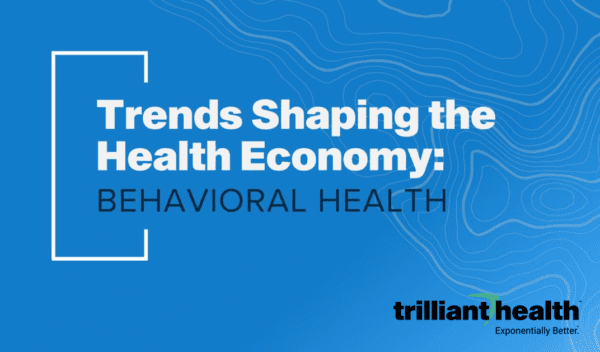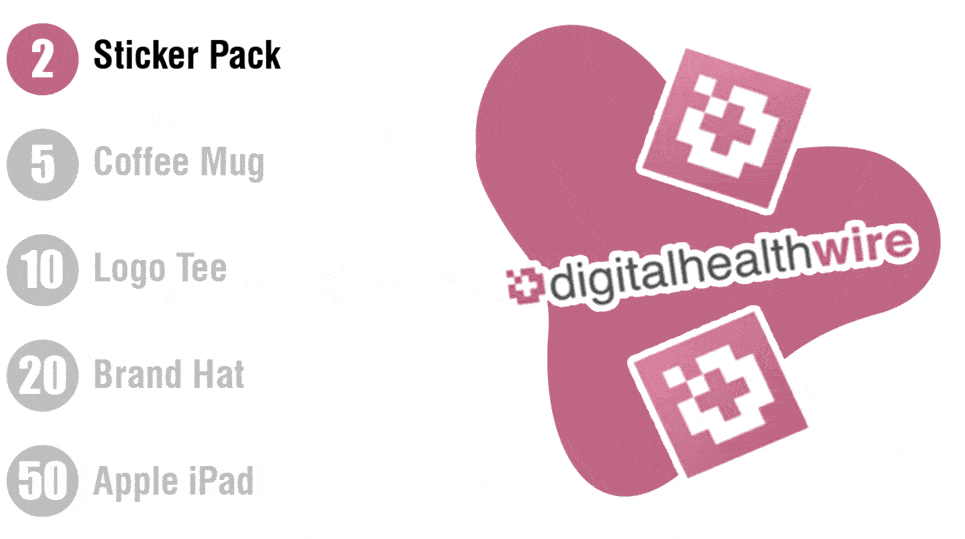|
Trilliant Behavioral Health | SVB Collapse
March 13, 2023
|
|
|

|
|
Together with
|

|
|
|
“To find a proper solution, you need a really clear baseline of what’s underneath the problem’s surface. Good solutions take into account the nuances.”
|
|
Trilliant Health Chief Research Officer Sanjula Jain, Ph.D.
|
|

|
|
Trilliant Health published a new report that’s pretty close to required reading for anyone working in behavioral healthcare – Trends Shaping the Health Economy: Behavioral Health.
The report does a thorough job wrapping numbers around the biggest trend in the space: patient demand is outpacing the supply of providers.
- Behavioral health volumes were 18.1% above pre-pandemic levels by Q2 2022, driven by a combination of stress-induced disorders and a 45X increase in telehealth utilization. Behavioral health visits accounted for 63.8% of total telehealth visits in Q2 2022.
- Since 2019, the conditions that saw the sharpest rise in visit volumes were eating disorders (up 52.6%), anxiety (47.9%), substance-use disorders (27.4%), depression (24.4%), and bipolar disorder (12.2%).
- Unlike many other areas of healthcare, behavioral health doesn’t appear to be a small group of high utilizers driving up volumes. In 2021, two-thirds of patients diagnosed with a mental health condition saw a provider five times or fewer.
Although telehealth was initially viewed as a way to expand access to therapy, the data paints a different picture of its actual impact. More prescriptions, treatments shifting away from behavioral health providers, and lackluster follow-up care.
- The share of patients with a prescription for antidepressants increased 15% from 2017 to 2021, while patients ages 22-44 saw Adderall prescriptions spike 58.2%.
- PCPs now prescribe the greatest share of behavioral health medications (42.3%), and NPs and PAs have also begun to account for a large share of prescribing volume (22%). Behavioral health providers account for just over a third of total prescribing volume.
- Most patients initially diagnosed by their PCP with schizophrenia (70.2%) or bipolar disorder (62.8%) received subsequent treatment from a behavioral health provider, but the same was true for only 30.3% of ADHD patients.
The Takeaway
Trilliant’s data provides a strong foundation to start asking the right questions about the direction behavioral healthcare is heading.
- Should high demand shift care settings for behavioral healthcare?
- Should primary care be the first line of defense?
- If PCPs are delivering this care, is more training needed to manage these conditions?
- Is this the proper balance between therapy and medication?
While Trilliant’s report isn’t setting out to answer these questions, it’s a valuable tool for those that are.
|




|
|
unResign From Nursing with connectRN
connectRN’s new campaign unResignation Notice is helping nurses recommit to the profession they love by highlighting both the challenges they face and the reasons why they want to return. “It’s not in a nurse’s nature to quit. Something needs to change, and it’s not the nurses.” Learn more and sign your own unResignation Letter here.
|
|
Clear Arch Health Reduces Readmissions at Altru
When Altru Health System set out to reduce hospital readmissions, it turned to Clear Arch Health to find the solution. Learn how Clear Arch Health’s complete RPM platform and clinical monitoring system helped Altru lower readmissions while improving post-acute care quality.
|
|
- Startup Bank Has a Startup Bank Run: We’ll get the worst news out of the way first. As you’ve probably heard, Silicon Valley Bank collapsed last week in the largest US bank failure since 2008. SVB apparently had business relationships with half of all venture-backed technology and healthcare companies, most of which spent their weekends scrambling to recover deposits. We’ll leave the cause of the collapse to the experts, but a government intervention late Sunday addressed immediate concerns over the risk of runs on other banks and affected startups making payroll. Godspeed to everyone impacted.
- Elemy Pivots Away From Care Delivery: Pediatric autism care company Elemy is the latest startup to pivot away from care delivery as it looks to achieve higher SaaS margins by shunning the costly overhead of employing physicians. Elemy last raised an absolutely massive $219M Series B at a $1.2B valuation in 2021, and it’s now looking to justify that skyhigh valuation by going the 98point6 route and offering physicians the software they need to deliver care rather than delivering it themselves.
- Tebra Patient Perspective Report: Tebra’s 2023 Patient Perspective Report showed that an online presence is quickly turning into a non-negotiable for attracting new patients, and that “doctor loyalty is a thing of the past.” The survey of 1.2k US adults found that 3 in 4 patients look online to research doctors or medical care, and that nearly half of patients won’t even consider a provider with few or no reviews. The full report also gives a great overview of the factors influencing patients to switch providers, such as better appointment availability (50%), quicker responses to concerns (41%), and having online access to health records (22%).
- Government Budget Healthcare Takeaways: Becker’s rounded up 15 healthcare takeaways from the US government’s recently proposed $6.8T budget for 2024. Headline numbers included a proposal to allocate $150B over 10 years to fund Medicaid home healthcare services and $144B for the HHS next year alone (up a cool $14.8B from 2023). Less lucky were rural hospitals, with the proposal only earmarking $30M to provide assistance to facilities at risk of closure and to support the expansion of service lines to meet rural community needs.
- Nuance Brings GPT to Contact Centers: Nuance is introducing a new GPT-powered capability for its contact center AI solutions that expands the number of engagements that can be handled through self-service. The Nuance Mix conversational AI platform will now leverage GPT to answer a broader set of customer questions, including complex inquiries that require a high level of reasoning and summarization. Given Nuance parent company Microsoft’s recent $10B investment in GPT-creator OpenAI, this is likely just the tip of the iceberg for their upcoming GPT integrations.
- Patients Appreciate Notes Access: A new survey from Brigham and Women’s found that health literacy isn’t standing in the way of patient data access, with only one in ten patients reporting issues understanding medical terminology or abbreviations in their clinical notes. Of the 359 respondents, 90% felt positively about having access to their notes and 70% felt the notes helped them better understand their medical conditions. Patients also didn’t appear put off by their providers’ language, with only 1.8% saying they trusted their providers less after viewing their notes.
- Wave Life Seed Round: Wave Life scored a $6M seed round to expand its Gen Z mental health platform to the employer market and improve its “recommengine” that tailors content to individual users. Wave Life’s three-pronged care model starts by walking users through a “Psychological Horoscope” needs assessment before offering them educational content on social media’s impact on mental health, an app with interactive wellness exercises, and on-demand emotional health coaching.
- Virtual HF Care’s Guideline Impact: An MGB-led study highlighted virtual care teams’ potential to safely, effectively, and scalably optimize guideline-directed medical therapy (GDMT) in patients with heart failure. Among 252 hospital encounters with a virtual care team-guided strategy or usual care, the virtual care team significantly improved GDMT scores (adjusted difference: +1.2). New initiations (44% vs. 23%) and intensifications of ≥1 GDMT (50% vs. 28%) were higher in the virtual care team group, while virtual care safety events were lower (21% vs. 28%).
- Russian Ransomware Escalation: A shadowy group of Russian hackers posted pictures of Lehigh Valley Health Network cancer patients on the dark web after the Pennsylvania health system refused to meet the group’s ransom demands last month. The episode looks like a sign of escalation by ransomware attackers as more hospitals refuse to meet their demands, and it could also spur more hospitals to seek safety in cloud-based data storage.
- December Telehealth Use: Fair Health’s Monthly Telehealth Regional Tracker showed that telehealth use climbed 3.8% in December (accounting for 5.5% of total visits), with COVID retaining its place as the third most common diagnosis and one-hour psychotherapy (CPT 90837) holding onto the top procedure code. The growth continued an increase that began in November, with utilization increasing in the South (7.1%), Midwest (5%), and Northeast (3.3%), while remaining unchanged in the West.
- Tempus Acquires Mpirik: Tempus Labs bolstered its precision cardiology capabilities with its acquisition of Mpirik. Mpirik’s AI-based Cardiac Intelligence software monitors EHRs to track patients with cardiovascular disease, flag treatment gaps, and automate care coordination. Tempus will integrate Mpirik into its Tempus Air platform, which similarly analyzes cardiology data to identify patients with undiagnosed and undertreated CVD. The acquisition shows that Tempus is still putting its massive funding to work ($1.3B so far), coming 5 months after acquiring imaging AI platform company Arterys.
|
|
Upgrade Your Prescribing Workflows
Whether you’re a care delivery organization or building products that have prescribers, there’s no need to build your prescribing workflow from scratch. Find out how connecting your prescribers to clinical decision support powered by real-time drug data can help provide the patient-centered insights needed for medication success.
|
|
What is Patient Engagement for a CMIO?
In its patient engagement guide for hospital execs, Nuance examines the goals and challenges of Chief Medical Information Officers, highlighting the ways that AI-powered patient engagement solutions can help CMIOs reduce physician burnout and improve care delivery.
|
|
Medallion Unites Family Care Center’s Credentialing Process
As Family Care Center set out to expand its behavioral health services, it needed a scalable provider credentialing solution so that its staff could keep focusing on patient care. Find out how Medallion’s CAQH-integrated platform helped Family Care Center onboard its providers faster by letting them complete their applications in two days instead of two weeks.
|
|
|
Share Digital Health Wire
|
|
Spread the news & help us grow ⚡
|
|
Refer colleagues with your unique link and earn rewards.
|

|
|
|
|
Or copy and share your custom referral link: *|SHAREURL|*
|
|
You currently have *|REFERRALS|* referrals.
|
|
|
|
|